Synopsis "The Abundance-Scarcity Paradox"
This book is for young adults and their parents striving to navigate the turbulent waters of this transformational epoch. We are partway through a period of change that probably began when a young Albert Einstein penned on a scrappy piece of paper e=mc2. In time this will most likely be characterized as among the most significant in history, perhaps even more impactful than the Renaissance. One feature of this reformation is sure to be the development of a deep appreciation for the place of abundance in both nature and our lives.Today most people, organizations and communities describe their existence as a struggle to survive. Rarely does anyone report on how much they are thriving. That is strange because never before has humanity as a whole been so wealthy, so bathed in abundance. One reason is that most of contemporary life is governed by economic systems predicated on scarcity. Because it is not possible to make money unless there are natural or artificially-induced shortages, we are prone to reason about tradeoffs using a scarcity logic.As with every reformation, this era is both exciting and taxing. Once this transformation has taken root we will come to recognize that all of life is predicated on abundance. And with that realization we will begin to make major shifts in our thinking and our prioritizing. Of special import will be the addressing of an ancient folly that still haunts us. In his famous economic text Adam Smith signaled this dilemma by rhetorically asking why we assign zero monetary value to water, which is essential for all lives, but pay a small fortune for diamonds whose utility is purely symbolic? Economists have mostly ignored this issue, although the British fiscal maestro, Maynard Keynes did gratituously dub it the water-diamond paradox. Given the current socio-political complexities, the global world cannot possibly be sustained by an economic system based solely on scarcity. It needs to be augmented by a new financial infrastructure centered on abundance.As a precursor to this anticipated economic shift we face a large task, to develop a coherent and collective sense of abundance. This will take time. Since we already know a great deal about scarcity it seems wise to prepare for this evolutionary inevitability by learning to describe every-day events using the principles of abundance.Abundance is a way of seeing, a method of thinking, a form of emoting and a manner of intuiting. So is scarcity. Diamandis and Kotler, in their book Abundance, present a compelling and optimistic case that the future is better than we think. In the past people have treated shortages as evidence of scarcity and have spoken about abundance in terms of excesses. Such notions are now being re-conceptualized.Abundance involves balancing consumption and replenishment, decay and regeneration, expired pasts and future dreams. It also depends on the restrictions and regulatory actions of Yin-Yang-like rheostats. As with a pregnancy approaching full-term, when the confining function of scarcity subsides, the landscape of what-is-to-be emerges.In an artful way this book shows how everyday events can be experienced as either awash with abundance or burdened by scarcity. If we so chose, we can all be guided by a self-created and communally-sustained sense of abundance. Learning how to see the best and the worst of times with an abundance rather than a scarcity lens is the special gift of this book.

